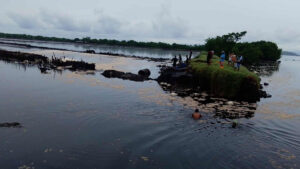📷: Environmental and marine specialists assess the impact of a wastewater spill off Bais City, Negros Oriental, within the Tañon Strait Protected Seascape. The leak originated from a distillery’s containment lagoon . (Environment Management Bureau-Negros Island Region)
By Diego Morra
The ethanol and wastewater spill from the Gokongwei-owned Universal Robina Corp. (URC) distillery plant in Bais City has caused a major fish kill in the coastal waters of Bais and Manjuyod town in Negros Oriental, thus polluting the Tañon Strait Protected Seascape (TSPS), regarded as one of the country’s most important marine biodiversity areas.
Investigation showed that the spill came from URC’s Sugar and Renewables Group (SURE) distillery and caused the discoloration of the water and fish kill. Ethanol’s seeping into the coastal waters in TSPS depletes dissolved oxygen, chokes aquatic life and threatens to snuff out the livelihoods of fisherfolk who survive on the products of the marine ecosystem. Due to the gravity of the spill, Bais Mayor Luigi Marcel T. Goñi also ordered URC’s distillery to stop operations on Oct. 28, 2025. Goñi said he also asked the company to craft a long-term solution to frequent spills that have rankled fisherfolk.
Aside from Bais residents who assailed URC for the spill, the Bureau of Fisheries and Aquatic Resources (BFAR) in Region 7 also confirmed that it has issued a warning to the public to stop fishing, collecting, or consuming seafood from affected waters in Bais and Manjuyod. BFAR said fish from these waters may be laced with toxic chemicals and pollutants. Dead fish should not be collected, sold or eaten, the bureau announced. As the ethanol spill immediately covered 300 hectares of Tanon Strait and barred Bais City residents from catching fish and other marine products, the city government declare a “state of calamity.” Forthwith, distillery operations were stopped.
The Pambansang Lakas ng Kilusang Mamamalakaya ng Pilipinas-Negros Island (Pamalakaya-Negros Island) and the environmental group Hakson Inc. called for accountability from URC for the spill on North Bais Bay that started on Oct. 24 and damaged 3,000 hectares of TSPS, which is considered one of the world’s most biodiverse marine ecosystems. The spill happened after the lagoon storing the URC’s ethanol collapsed. Strangely, the Gokongwei company blamed the collapse on successive earthquakes and heavy rains. Hakson Inc. rejected the reason advanced by URC, noting that natural disasters should not be blamed for decades of substandard and unsafe waste and pollution management.
“It is the predictable outcome of a development model that prioritizes ethanol export and private gain over ecological safety,” Hakson Inc. stated. Pamalakaya added that the disaster was the result of the company’s negligence and disrespect for the environment and the people. The spill stole the livelihoods of more than 3,000 fisherfolk in Bais City and Manjuyod town. This prompted the fisherfolk themselves to seek immediate financial assistance from the local government and long-term compensation from URC, which was responsible for the spill in the first place.
“Thousands of fisherfolk will surely take long to recover their livelihood…so local authorities and relevant government agencies must take swift action to help those who cannot go out to fish,” Pamalakaya-Negros Island chairperson Vincent Fernandez said. Tañon Strait’s rich waters harbor 14 species of cetaceans, including the endangered Irrawaddy dolphin, as well as turtles, whale sharks, and a variety of coral and seagrass species. Hakson Inc. and Pamalakaya-Negros Island have demanded that URC to pay for Bais Bay’s full rehabilitation and compensate fisherfolk for their lost income.
For its part, the non-profit Oceanus Conservation, which has been working to maintain the ecological integrity of Tanon Strait, welcomed the prompt actions of both the Bais City government and BFAR in Region 7 to contain the disaster. Oceanus Conservation executive director Frances Camille Rivera asked the Department of Environment and Natural Resources (DENR) and the Environmental Management Bureau (EMB) to conduct a transparent and independent investigation into the spill and release findings to the public, penalize those responsible for the spill under Republic Act No. 9275, also known as the Clean Water Act, and relevant TSPS management regulations, implement ecosystem restoration measures, including water-quality monitoring and rehabilitation of affected habitats and engage local communities and fisherfolk in recovery and monitoring efforts to ensure inclusive environmental management.
Meanwhile, the DENR said URC’s permit to operate the distillery and wastewater lagoon will be reviewed by the department. “DENR will conduct a comprehensive review of URC’s Environmental Compliance Certificate (ECC) and other related permits,” it said. If warranted, DENR will initiate administrative, civil, and criminal proceedings against responsible parties. An estimated 255,000 cubic meters of molasses wastewater were discharged into Bais Bay in Negros Oriental as a result of the spill. This volume could affect 382.29 hectares of marine areas across 13 barangays within the TSPS.





Downloaded the z8slotapp the other day. Runs smooth on my phone and lots of slots to choose. Good way to kill some time on commute. You should totally try z8slotapp
Heyyy everyone! Been using the rio66betapk.org app and it’s pretty handy. Easy to place bets quickly. Highly recommended! Try it out here: rio66betapk